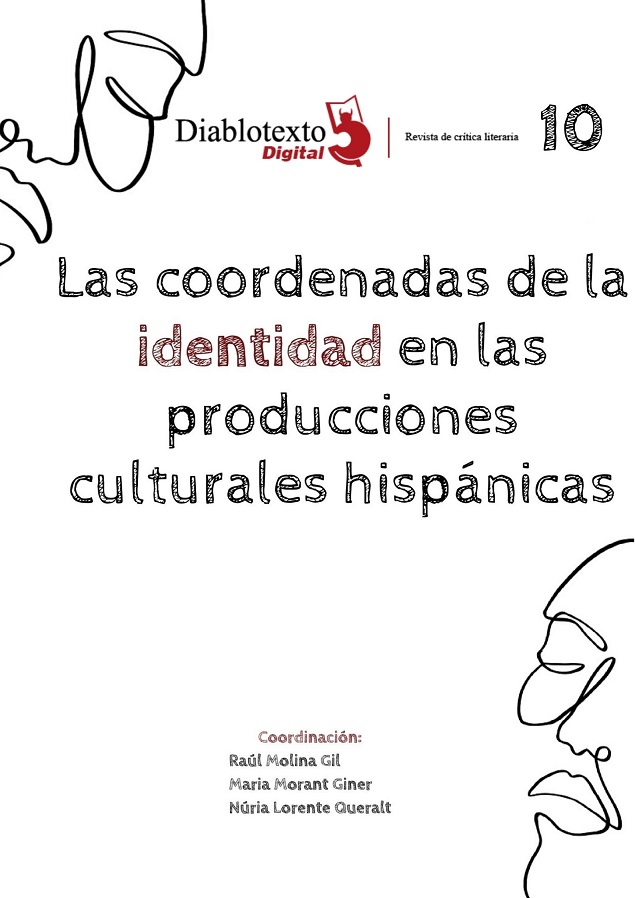INTERSECTIONS OF GENRE. AUTOETNOGRAPHY AND AU-TOBIOGRAPHY IN NORMA MEJIA’S TRANSGENERISMOS (2006)
DOI:
https://doi.org/10.7203/diablotexto.10.21666Keywords:
Trans Studies, Autobiography, Autoetnography, Norma Mejía, Transgenerismos Abstract
Abstract
Norma Mejia’s Transgenerismos (2006) was the first Phd dissertation about transsexuality defended in Spain by a trans person. Nevertheless, the text has an added value as it can also be read as an autobiography because of its textual characteristics. This paper focuses on the possibilities of that reading, based on the shifts produced by the anthropological methodology to which the author is adscribed: the autoethnography. In addition, we would show the mechanisms used by Mejía in order to dialogue, in her writing, with both discourses: literary and academic.
 Downloads
Downloads
 References
References
Ames, Jonathan (ed.) (2005). Sexual Metamorphosis: An Anthology of Transsexual Memoirs. New York: Vintage
Blanco, Mercedes (2012). “¿Autobiografía o autoetnografía?”. Desacatos, n.º 38, pp. 169-178.
Bolin, Anne y Jane Granskog (2003). Athletic Intruders: Ethnographic Research on Women, Culture, and Exercise. Albany: State University of New York Press.
Bourdieu, Pierre (1989). “La ilusión biográfica”. Historia y Fuente Oral, n.º 2, pp. 27-33.
Costa, Mario (1963). Coccinelle est lui. Paris: Les Presses du Mail.
De Miguel, Jesús (2017). Auto/biografías. Madrid: Centro de Investigaciones Sociológicas.
Ellis, Carolyn; Tony E. Adams y Arthur P. Bochner (2015). “Autoetnografía: un panorama”. Astrolabio. Nueva época, n.º 14, pp. 249-278.
Esteban, Mari Luz (2004). “Antropología encarnada. Antropología desde una misma”. Papeles del CEIC, n.º 12, pp. 1-22. En: http://www.ehu.es/CEIC/papeles/12.pdf [Fecha de acceso: 15 julio 2019].
Farias de Albuquerque, Fernanda y Maurizio Jannelli [1994] (1996). Princesa. Traductor Joaquín Jordá. Barcelona: Anagrama.
Feixa, Carles (2000). "La imaginación autobiográfica". Nómadas, n.º 18, pp.80-93.
Harris, Marvin (1982). El materialismo cultural. Traductor Gonzalo Gil Catalina. Madrid: Alianza.
Langarita, Jose Antonio (2015). En tu árbol o en el mío. Una aproximación etnográfica a la práctica del sexo anónimo entre hombres. Barcelona: Bellaterra.
Lejeune, Philippe (1975). Le pacte autobiographique. Paris: Seuil.
Matos, Pilar (2007). De niño a mujer. Biografía de Dolly Van Doll. Córdoba: Arco Press.
Mejía, Norma (2006). Transgenerismos. Una experiencia transexual desde la perspectiva antropológica. Barcelona: Bellaterra.
Mejía, Norma (2004). Lorena mi amor. Barcelona: La Tempestad.
Mérida Jiménez, Rafael M. (2018). “Hacia una cartografía de las textualidades autobiográficas trans en España”. En Dieter Ingenschay (ed.), Eventos del deseo. Sexualidades minoritarias en las culturas/literaturas de España y Latinoamérica a finales del siglo XX. Madrid-Frankfurt: Iberoamericana-Vervuert, pp.155-168.
Mérida Jiménez, Rafael M. (2015). “Norma Mejía: narrativas y memorias transgenéricas”. En Jorge Luis Peralta y Rafael M. Mérida Jiménez (eds.), Memorias, identidades y experiencias trans. (In)visibilidades entre Argentina y España. Buenos Aires: Biblos, pp. 78-94.
Nieto Piñeroba, José Antonio (2008). “Entrante”. EnTransexualidad, intersexualidad y dualidad de género. Barcelona: Bellaterra, pp. 11-32.
Pierrot (2005). Memorias trans. Transexuales, travestis, transformistas. Barcelona: Morales i Torres.
Plummer, Ken (1995). Telling Sexual Stories. Power, Change and Social Worlds. Londres: Routledge.
Pozuelo Yvancos, José María (2006). De la autobiografía. Teoría y estilos. Madrid: Crítica.
Preciado, Beatriz (2008). Testo yonki. Madrid: Espasa-Calpe.
Stryker, Susan (2008). “Transgender history, Homonormativity and Disciplinarity”. Radical History Review (January), n.º 1, pp. 145-157.
Downloads
Published
How to Cite
-
Abstract377
-
PDF (Español)170
Issue
Section
License
Licencia de reconocimiento de Creative Commons “Reconocimiento - No Comercia l- Sin Obra Derivada
Authors who publish with this journal agree to the following items:
The authors will keep their copyright and guarantee the journal the right of first publication of their work, which will be simultaneously subject to the Creative Commons license that allows third parties to share the work indicating its author and its first publication in the journal. The authors may adopt other non-exclusive license agreements to distribute the version of the published work (e.g., depositing it in an institutional telematic file or publishing it in a monographic volume), with an acknowledgment of its initial publication in this journal. The authors are allowed and encouraged to disseminate their work through the Internet (e.g., in institutional telematic archives or on their website) before and during the submission process, which can produce interesting exchanges and increase citations of the published work. (See Effect of Open Access)




